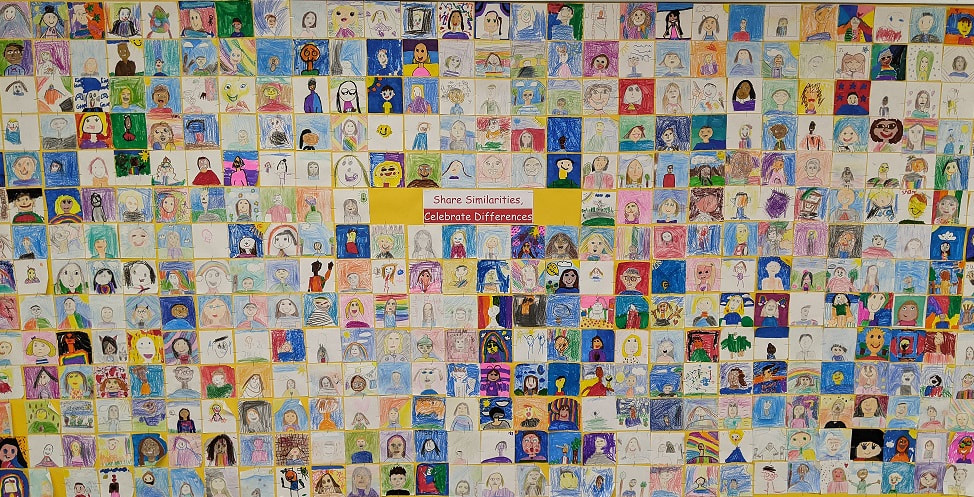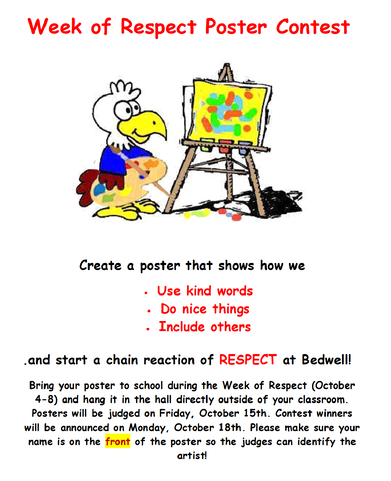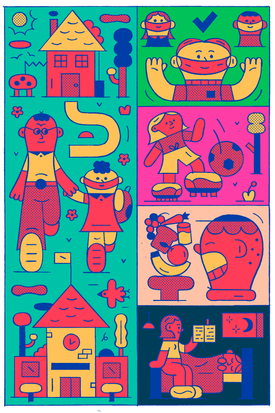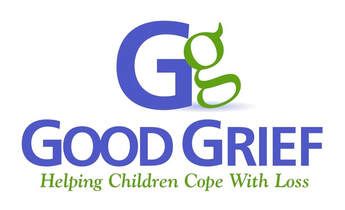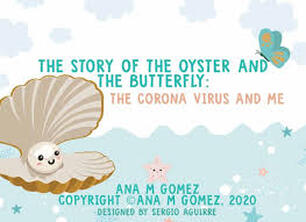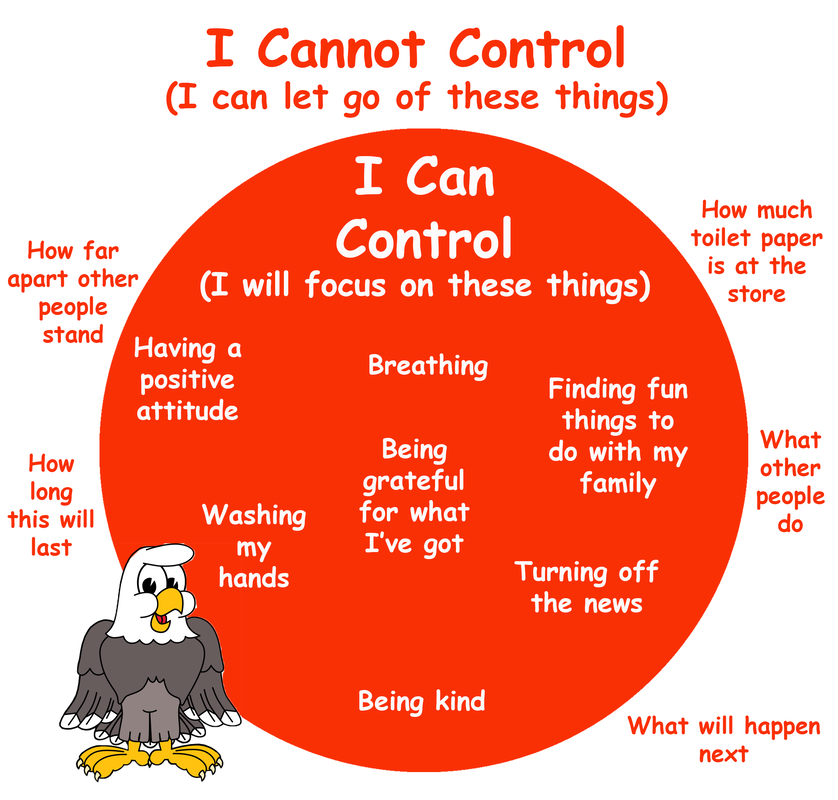news and events
The Great Kindness Challenge
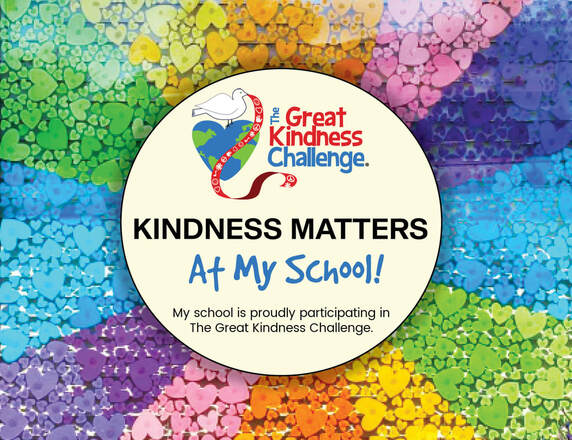
Bedwell is very excited to once again be participating in The Great Kindness Challenge during the week of January 24-28! The Great Kindness Challenge (GKC) is a proactive and positive SEL-focused bullying prevention program that improves school climate and increases student engagement. The GKC is making schools, communities, and the world a kinder and more compassionate place for all by shining a spotlight on positive behavior and reminding everyone that kindness matters. Students will keep track of their personal acts of kindness using a GKC checklist. At the end of the week, all of the acts of kindness performed at Bedwell will be tallied and the total will be sent to GKC headquarters to be added to the world total.
Hope and Healing Healing
RWJBarnabas Health Institute for Prevention and Recovery’s Hope and Healing Program offers emotional support services, education and community-based resources for individuals and families affected by the COVID-19 pandemic. Through a variety of virtual services, this program aims to assist those impacted by the pandemic to better adjust to their new reality, mitigate stress, review options, develop coping strategies, and, if needed, find linkages to agencies, programs, and other resources in their community. For more information, please call 833-795-HOPE (4673) or email [email protected].
We All Fit In At Bedwell!
Can you imagine what it would be like if everybody was the same? It would be like going to a library that had 10,000 copies of the same book. Or eating the exact same thing for breakfast, lunch and dinner for the rest of your life. Boring, right? Thank goodness everybody at Bedwell is one of a kind!
RWJBarnabas
Hope and Healing Program
RWJBarnabas Health Institute for Prevention and Recovery’s Hope and Healing Program offers emotional support services, education and community-based resources for individuals and families affected by the COVID-19 pandemic.
Through a variety of virtual services, this program aims to assist those impacted by the pandemic to better adjust to their new reality, mitigate stress, review options, develop coping strategies, and, if needed, find linkages to agencies, programs, and other resources in their community.
For more information, please call 833-795-HOPE (4673) or email [email protected].
Through a variety of virtual services, this program aims to assist those impacted by the pandemic to better adjust to their new reality, mitigate stress, review options, develop coping strategies, and, if needed, find linkages to agencies, programs, and other resources in their community.
For more information, please call 833-795-HOPE (4673) or email [email protected].
October News
New Jersey has designated the first week of October as a “Week of Respect”. During this week at Bedwell, all students received age-appropriate instruction focusing on the prevention of harassment, intimidation, and bullying.
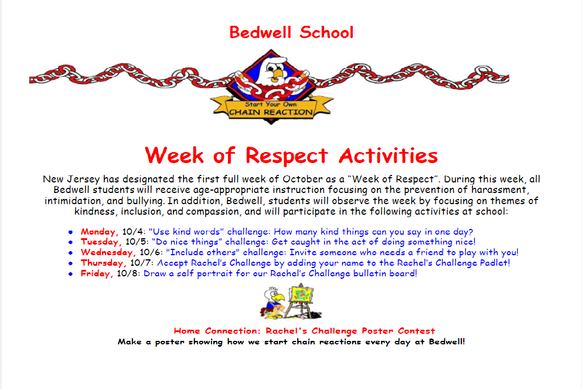
Our Week of Respect activities also included the creation of a bulletin board featuring every Bedwell student's self portrait! In addition, students received daily challenges encouraging them to get "caught in the act" of using kind words, doing nice things, and including others. All students were invited to create a Rachel's Challenge poster for our annual Week of Respect poster contest. In addition, students were invited to create a "Rachel's Challenge" poster, showing how we create a chain of good deeds at Bedwell.
September News
Bedwell Spirit Week!Now in its eleventh year, our Rachel's Challenge anti-bullying initiative got off to a great start on September 20th when all Bedwell students were reminded of the importance of "using kind words, doing nice things, including others, and starting your own chain reaction" at our virtual character education kick-off assembly hosted by our school mascot, Character Ed. The Rachel's Challenge program provides a sustainable, evidence-based framework for creating a positive climate and culture in schools. We believe that implementation of Rachel's Challenge has resulted in a safer, more emotionally connected atmosphere at Bedwell, where kindness and respect prevail.
Rachel’s Challenge encourages students to start a chain reaction of compassion by acting with kindness, choosing positive influences, and looking for the best in others. Students who are caught in the act of demonstrating positive behavior receive a paper chain link describing their act. Their link gets deposited into a grade-level jar in the Bedwell lobby. Each Friday, one link (two on Spirit Days!) is drawn from each grade-level jar during the morning announcements. Those students receive a "Caught in the Act" bracelet and have their picture displayed on the front lobby bulletin board.
We also recognize a monthly “Chain Reaction Superhero”! Each month, the student caught in the act that most epitomizes the characteristics of “chain reaction behavior” will have her or his picture displayed on a dedicated bulletin board and will receive some special superhero bling! All of the chain links collected during the week will be stapled together to form a long chain of good deeds that will grow longer and longer and travel through the halls of Bedwell as the year progresses.
Rachel’s Challenge encourages students to start a chain reaction of compassion by acting with kindness, choosing positive influences, and looking for the best in others. Students who are caught in the act of demonstrating positive behavior receive a paper chain link describing their act. Their link gets deposited into a grade-level jar in the Bedwell lobby. Each Friday, one link (two on Spirit Days!) is drawn from each grade-level jar during the morning announcements. Those students receive a "Caught in the Act" bracelet and have their picture displayed on the front lobby bulletin board.
We also recognize a monthly “Chain Reaction Superhero”! Each month, the student caught in the act that most epitomizes the characteristics of “chain reaction behavior” will have her or his picture displayed on a dedicated bulletin board and will receive some special superhero bling! All of the chain links collected during the week will be stapled together to form a long chain of good deeds that will grow longer and longer and travel through the halls of Bedwell as the year progresses.
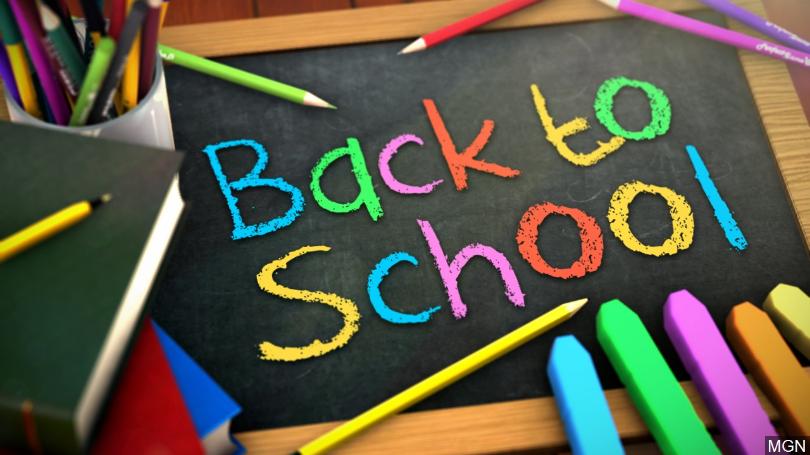
Sssh...don't tell the kids, but summer break is almost over! Whether your child is a returning Bedwell student or is coming to our school for the first time, starting the school year can be an enormous source of stress-for the whole family! Fortunately, most back-to-school butterflies can be eased by planning ahead and getting back into a school-night routine a few weeks before school begins. In addition to becoming readjusted to wearing a mask for an extended period of time, here are a few tips to make the summer to school transition and the whole year run smoother.
1. Get the whole family back on an early-to-bed schedule before school starts. Elementary school age kids do best with 9 1/2-11 hours of sleep a night. By keeping an eye on the calendar and moving bedtime a bit earlier every night, kids should be back on their school year sleeping schedule by the start of school. Getting enough sleep will make morning routines much easier!
2. Practice saying goodbye. For many kids, the biggest challenge about starting school will be saying goodbye to you. By developing a parting routine, such as a hug and a promise to see them soon, kids will feel reassured that starting school is just another temporary separation. Many kids feel comforted by having a family picture in their backpack or a special note in their lunchbox.
3. Have a few socially distanced outdoor play dates with new classmates. Once class lists have been sent home, it can be helpful to arrange play dates with kids who will be in your son's or daughter's class. The first day will go much smoother if your child already has already made some connections.
4. Start the day right. Many kids don't feel like eating much on the first day of school; however, your daughter or son will face the day better prepared if she or he has had a good breakfast. Ask them ahead of time what they'd like for breakfast on the first day, and be sure you have some of those favorite breakfast foods on hand.
5. Do your child (and yourself!) a favor by finding out what supplies will be needed on the first day, then making sure they're purchased and packed up the night before. While you're at it, have your child choose and lay out the clothes he or she will be wearing on the first day!
6. Help your child choose and equip a quiet study zone where homework will be done. Include your child in a discussion about when the best time to do homework might be and what the atmosphere should be like (most kids know that distractions such as electronics, siblings, etc., are not conducive to doing their best), and then help her or him establish and stick to a good routine.
7. You may be just as anxious as your child when it comes to the first day of school but try to conceal your worries. Emphasize the positive things about going back to school, such as hanging out with old friends, meeting new classmates, and getting involved in sports and other activities. Allow kids time to adjust. Remind them that everyone feels a little nervous about the first day of school and that it will all become an everyday routine in no time.
8. If your child gets teary when you say goodbye, reassure her or him that everything will be fine and that you can’t wait to be together again at the end of the day. Use the goodbye routine you’ve practiced, and then hand her or him off to her teacher and leave. Don't worry! Experienced teachers know about first day jitters and are used to helping kids overcome them. If your child continues to have a hard time separating, be sure to speak with the teacher.
Although it's normal to be anxious in any new situation, a few kids develop real physical symptoms, such as headaches or stomachaches, associated with the start of school. If you're concerned that your child's worries go beyond the normal back-to-school variety, speak with your child's doctor, teacher, or school counselor.
1. Get the whole family back on an early-to-bed schedule before school starts. Elementary school age kids do best with 9 1/2-11 hours of sleep a night. By keeping an eye on the calendar and moving bedtime a bit earlier every night, kids should be back on their school year sleeping schedule by the start of school. Getting enough sleep will make morning routines much easier!
2. Practice saying goodbye. For many kids, the biggest challenge about starting school will be saying goodbye to you. By developing a parting routine, such as a hug and a promise to see them soon, kids will feel reassured that starting school is just another temporary separation. Many kids feel comforted by having a family picture in their backpack or a special note in their lunchbox.
3. Have a few socially distanced outdoor play dates with new classmates. Once class lists have been sent home, it can be helpful to arrange play dates with kids who will be in your son's or daughter's class. The first day will go much smoother if your child already has already made some connections.
4. Start the day right. Many kids don't feel like eating much on the first day of school; however, your daughter or son will face the day better prepared if she or he has had a good breakfast. Ask them ahead of time what they'd like for breakfast on the first day, and be sure you have some of those favorite breakfast foods on hand.
5. Do your child (and yourself!) a favor by finding out what supplies will be needed on the first day, then making sure they're purchased and packed up the night before. While you're at it, have your child choose and lay out the clothes he or she will be wearing on the first day!
6. Help your child choose and equip a quiet study zone where homework will be done. Include your child in a discussion about when the best time to do homework might be and what the atmosphere should be like (most kids know that distractions such as electronics, siblings, etc., are not conducive to doing their best), and then help her or him establish and stick to a good routine.
7. You may be just as anxious as your child when it comes to the first day of school but try to conceal your worries. Emphasize the positive things about going back to school, such as hanging out with old friends, meeting new classmates, and getting involved in sports and other activities. Allow kids time to adjust. Remind them that everyone feels a little nervous about the first day of school and that it will all become an everyday routine in no time.
8. If your child gets teary when you say goodbye, reassure her or him that everything will be fine and that you can’t wait to be together again at the end of the day. Use the goodbye routine you’ve practiced, and then hand her or him off to her teacher and leave. Don't worry! Experienced teachers know about first day jitters and are used to helping kids overcome them. If your child continues to have a hard time separating, be sure to speak with the teacher.
Although it's normal to be anxious in any new situation, a few kids develop real physical symptoms, such as headaches or stomachaches, associated with the start of school. If you're concerned that your child's worries go beyond the normal back-to-school variety, speak with your child's doctor, teacher, or school counselor.
How to Prep Kids for a Potentially Bumpy Return to School
As students prepare to return to school this fall, concerns about safety, academic performance, and what toll a year without normal socialization has taken. This August 17th article in the NY Times offers solid advice on how to support your kids (and yourself!) and ensure a smooth re-entry to school for your child.
www.nytimes.com/2021/08/17/well/family/back-to-school-covid-delta-variant.html?referringSource=articleShare
www.nytimes.com/2021/08/17/well/family/back-to-school-covid-delta-variant.html?referringSource=articleShare
Stay Strong!
Karen Young is an Australian therapist who has an online resource called "Hey Sigmund". She offers timely, research-driven information with an emphasis on strengthening the mental wellness of children and adolescents. She often offers free webinars on timely topics. Worth checking out!
https://www.heysigmund.com/
https://www.heysigmund.com/
How to Support Kids' Return to School During COVID-19
Here we go again! Once again, parents are faced with uncertainty about how to prepare their kids for the upcoming year, especially since circumstances are rapidly changing in real time.
It’s okay to be realistic with your kids and tell them that you don’t know all of the answers yet, but once you know what the plan is for your child’s return to school, talk to her or him about what might be different. Kids feel reassured when they are aware of what plans are in place and what changes to expect. This moment is perfect to model how to use coping strategies and be flexible during times of uncertainty. Helping kids focus on the things they can control such as social distancing, hand washing, and the proper way to wear a mask can help reduce their stress and allow them to feel empowered. Practicing those skills before school starts will help them seem familiar when they need to use them at school.
Kids are resilient by nature, but parents can model that resilience too. Being flexible, adapting to change, and focusing on the positive are all important life skills to have, and COVID-19 is a great teaching moment for developing those skills. Parents can reassure their kids that if anything changes, the adults in their lives will work together as a team to come up with a new plan to keep them safe, learning, and connecting with other people. Below are some tips for helping kids ease into this new school routine.
It’s okay to be realistic with your kids and tell them that you don’t know all of the answers yet, but once you know what the plan is for your child’s return to school, talk to her or him about what might be different. Kids feel reassured when they are aware of what plans are in place and what changes to expect. This moment is perfect to model how to use coping strategies and be flexible during times of uncertainty. Helping kids focus on the things they can control such as social distancing, hand washing, and the proper way to wear a mask can help reduce their stress and allow them to feel empowered. Practicing those skills before school starts will help them seem familiar when they need to use them at school.
Kids are resilient by nature, but parents can model that resilience too. Being flexible, adapting to change, and focusing on the positive are all important life skills to have, and COVID-19 is a great teaching moment for developing those skills. Parents can reassure their kids that if anything changes, the adults in their lives will work together as a team to come up with a new plan to keep them safe, learning, and connecting with other people. Below are some tips for helping kids ease into this new school routine.
- Help your child practice self-care by:
- Getting plenty of sleep
- Exercising
- Eating well
- Communicating their feelings
- Taking breaks
- Staying socially connected
- Once school begins, talk with your child about how things are going and about interactions with classmates and teachers. Find out how your child is feeling and communicate that what they may be feeling is normal.
- Watch for any changes in your child’s behavior such as excessive crying or irritation, excessive worry or sadness, unhealthy eating or sleeping habits, difficulty concentrating, any of which may be signs of your child struggling with stress and anxiety. Be sure to communicate these behaviors to your child’s teacher and counselor so that additional support may be provided.
- Try to attend school activities and meetings which may be offered virtually. Staying informed and connected may reduce your feelings of anxiety, will help you understand learning expectations, and will provide a way for you to express any concerns you may have.
- Identify opportunities for your child to connect with peers, either virtually or in person, while maintaining physical distance.
Why Stressed Brains Can't Learn
More information about the importance of self care for kids! I'm attaching a link for a video from a website called Hey Sigmund which translates the latest research and news in psychology into actionable strategies. This particular video is all about the SEL component of learning and why stressed brains can't learn.
https://www.youtube.com/watch?v=zjHuJdbtrQE
https://www.youtube.com/watch?v=zjHuJdbtrQE
Good Grief Schools Webinars
Parenting is a stressful experience at the best of times, but a pandemic presents a new set of challenges as families spend more time together than ever before and feel a loss of control over their lives and their futures. The people at Good Grief have put together two webinars that address this uniquely challenging and stressful time. Resilience Through Mindfulness provides tools for teaching children to develop mindfulness, the simple practice of turning inward to pay attention to the present moment. Practicing Self-Kindness focuses on the needs of parents who often struggle with being able to prioritize taking care of themselves alongside taking care of the needs of their families. Please click on the titles to enjoy these excellent resources!
The Story of the Oyster and the Butterfly:
The Corona Virus and Me
These unprecedented times can cause anxiety for everyone, including young children. Ana M. Gomez wrote The Story of the Oyster and the Butterfly: the Corona Virus and Me to help children deal with their feelings of worry, fear, and anxiety. Click the link below to open the book.
https://www.psychologists.bc.ca/sites/default/files/Book%20Oyster%20%26%20Butterfly%20For%20Kids%20Related%20to%20COVID.pdf
https://www.psychologists.bc.ca/sites/default/files/Book%20Oyster%20%26%20Butterfly%20For%20Kids%20Related%20to%20COVID.pdf
Ways to Help Anxious Kids
Click the link below for a NY Times article about ways to support kids who are showing signs of anxiety.
https://nyti.ms/2wSOpgJ
https://nyti.ms/2wSOpgJ
Just For Fun!
The link below is a good source of non-electronic activities for the whole family from nymetroparents.com.
In or Out of My Control?
Helping students understand what they can and cannot control is critical for their emotional well-being. Trying to control things can leave them feeling anxious, overwhelmed, and unable to focus. Making a visual reminder to conceptualize the things they can and cannot control can be an effective way to reinforce the many positive things they can do to calm themselves. Make a family version!
What to Say to Help Kids Feel Calm When the World Feels Fragile
The link below connects to an article from the website Hey Sigmund, a site dedicated to the latest research and news in psychology. The article offers excellent tips for how to support kids experiencing anxiety related to COVID 19.
Covid 19 Resources to Support Kids and Families
Here is a link to a collection of resources put together by the Social Emotional Learning Alliance to support efforts to help young people reduce, manage, and cope with the fears, worries and anxieties that might be provoked by this health crisis.
https://sel4us.org/covid-19-sel-mental-health/?link_id=0&can_id=b1c2bf0e6143755bcbab4cecedb8a844&source=email-sel-and-mental-health-resources-during-covid-19-outbreak&email_referrer=email_753498&email_subject=sel-and-mental-health-resources-during-covid-19-outbreak
https://sel4us.org/covid-19-sel-mental-health/?link_id=0&can_id=b1c2bf0e6143755bcbab4cecedb8a844&source=email-sel-and-mental-health-resources-during-covid-19-outbreak&email_referrer=email_753498&email_subject=sel-and-mental-health-resources-during-covid-19-outbreak
Coronavirus Information for Kids
Click on the link below to open a printable comic book created by NPR education reporter, Cory Turner. He asked some experts what kids might want to know about the coronavirus and turned it into a kid-friendly source of accurate information. There's also a link for a video that explains how to fold an 8 1/2" X 11" piece of paper into an 8 page mini book.
https://drive.google.com/file/d/1PYrKYfOBa4p-azI5z_46KJMbi1FSmL_Y/view?usp=sharing
https://www.youtube.com/watch?v=Ixqr9e3wCxI
https://drive.google.com/file/d/1PYrKYfOBa4p-azI5z_46KJMbi1FSmL_Y/view?usp=sharing
https://www.youtube.com/watch?v=Ixqr9e3wCxI
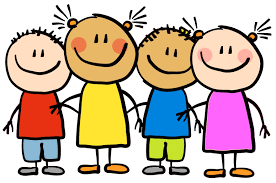
Talking to Kids About Coronavirus
As we all continue to try to make sense of the unfolding reality of COVID-19 and manage our own levels of stress, it is critical to bear in mind what the effect of nonstop negative news and uncertainty is on our kids. The experts at the Child Mind Institute have offered some advice on how to discuss the coronavirus with young children in a way that is reassuring and will not make them more worried than they may already be.
- Don’t be afraid to discuss the coronavirus. Fact-based information is likely more reassuring than whatever they’re hearing from their friends or on the news.
- Be developmentally appropriate. Don’t volunteer too much information, as this may be overwhelming.
- Take your cues from your child. Invite your child to tell you anything they may have heard about the coronavirus, and how they feel.
- Deal with your own anxiety. If you notice that you are feeling anxious, take some time to calm down before trying to have a conversation or answer your child’s questions.
- Be reassuring. It’s helpful to reassure your child that kids seem to have milder symptoms.
- Focus on what you’re doing to stay safe. An important way to reassure kids is to emphasize the safety precautions that you are taking.
- Stick to routine. Structured days with regular mealtimes and bedtimes are an essential part of keeping kids happy and healthy.
- Keep talking. Tell kids that you will continue to keep them updated as you learn more.

